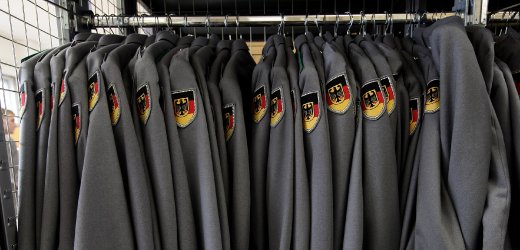
Germany’s new coalition government has cut the period military conscripts must serve from nine months to six. And there’s a fair chance they’ll end mandatory service altogether. It’s about time.
There’s little doubt that the draft has long ended its military usefulness. The United States has relied on an all-volunteer force since 1973 and almost all of our NATO Allies have followed suit.
As Spiegel‘s Michael Fröhlingsdorf, Sven Röbel and Christoph Scheuermann reported last month ("For Conscripts, German Military Service is Battle against Boredom") the draftees "are just a burden to the Bundeswehr, which has no need for half-trained conscripts."
For Germany, a country surrounded by friendly neighbors, national defense is hardly a concern anymore. Bundeswehr soldiers are now fighting in Afghanistan or overseeing a weapons embargo off the coast of Lebanon as part of the United Nations’ UNIFIL force. The army’s young conscripts are of no use to anyone. Poorly trained and neglected by the government, they spend much of their military service killing time.
But the politics are another matter.
The question of what should be done with them is currently the subject of heated debate in Berlin. If Defense Minister Karl-Theodor zu Guttenberg has his way, the draft will soon be eliminated. Though a vocal supporter of compulsory military service until recently, Guttenberg, who belongs to the conservative Christian Social Union (CSU), the Bavarian sister party to Angela Merkel’s Christian Democratic Union, has changed his position. Now Guttenberg, who holds the rank of corporal in the reserves, told SPIEGEL in an interview that "in practice (military service) will be gone in 10 years."
With this statement, Guttenberg antagonized members of his own party, especially Volker Kauder, the floor leader of the conservatives’ parliamentary group. Kauder says that compulsory military service is a core concern of his party, the CDU, and that it is an "instrument for linking society with the Bundeswehr." CSU leader Horst Seehofer, who characterizes his party as "a party of the Bundeswehr," says: "We say yes to compulsory military service." Chancellor Angela Merkel, who considers compulsory military service a "success story," reined in the defense minister, because she believes that a large proportion of her voters support military service.
But this sentiment is up against a new reality:
But now there is some hope that things could change, because the government has to tighten its belt. Without the funds to support it, the draft will probably soon cease to exist. Officials at the Defense Ministry have calculated that the Bundeswehr would cost the government almost €500 million ($610 million) less per year if military service were abolished.
If, as some predict, the military budget will be cut by forty percent, it would be madness to spend a large chunk of what’s left on troops who don’t want to be there, can’t be deployed for sustained operations, and are out the door soon after their initial training is completed.
The best military argument is advanced today by former defense minister Volker Rühe and Ulrich Weisser, a retired vice admiral. They devote several paragraphs to the need to maintain a strong defense, budget pressures be damned, rather than lag behind less prosperous European Allies. And I couldn’t agree more!
But their argument for maintaining compulsory service is thin:
The federal government has cut compulsory military service to the point of senselessness, and thus destroyed it. The law is a serious intervention into the military’s sensitive structure, which includes career soldiers, soldiers who have signed up for a fixed term, conscripts who have extended their military service, soldiers performing their basic military service and reservists.
By taking this step, Germany is depriving itself of the option of quickly expanding its armed forces in the future, in the event of a serious crisis. No one should foster any illusions: Compulsory military service, even if it is not actually removed from the Basic Law (editor’s note: Germany’s constitution), could not be reactivated. Such a step would be just as likely to escalate a crisis as the mobilization of forces. Suspension means abolition.
But there’s little evidence that these lightly trained conscripts will be particularly useful in the event of a major war. Their skills, such as they are, will be rusty and they’ll certainly be out of shape.
As a companion piece ("Conscription Debate Divides German Conservatives") notes, the chief rationale for proponents of conscription seems to be nostalgia.
Conscription may be outdated, but it is difficult for Germany to let go of the tradition. It is a firm part of postwar German culture and military policy. More than 8 million young men have passed through the nation’s military training system in the postwar period, where, to the delight of their parents, they learn how to neatly fold a shirt to exactly match the size of an A4 page. Aside from that, however, the purpose and usefulness of compulsory military service have gradually disappeared in the years since the end of the Cold War.
Although it is a relic, the CDU, the most staunchly German of all the country’s political parties, sees conscription as part of Germany’s genetic code. The party introduced conscription in 1956 in the face of strong opposition. Now many conservatives do not understand why it should be abandoned, merely because the federal budget is short of a few billion.
CDU/CSU floor leader Volker Kauder has a book by the Berlin political scientist Herfried Münkler on his bookshelf. Its title is "Die Deutschen und ihre Mythen" ("The Germans and their Myths"). For Kauder, compulsory military service is one of those myths that shape German identity and also forms part of the CDU/CSU’s core identity. It is something he is unwilling to give up.
A myth is powerful, indeed, if someone can simultaneously recognize it as such and defend it.
James Joyner is managing editor of the Atlantic Council.
Image: bundeswehr-uniforms.jpg
